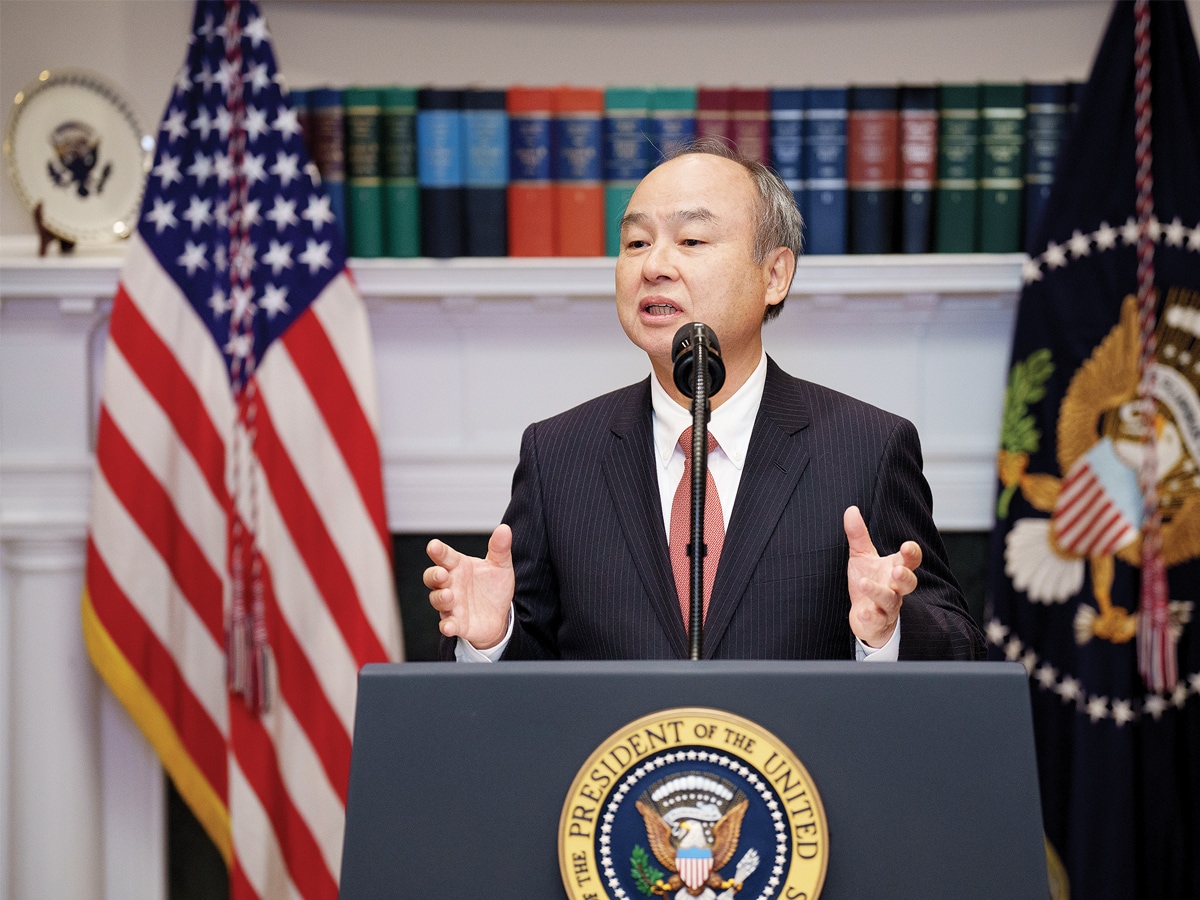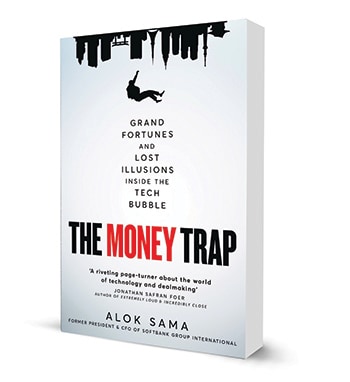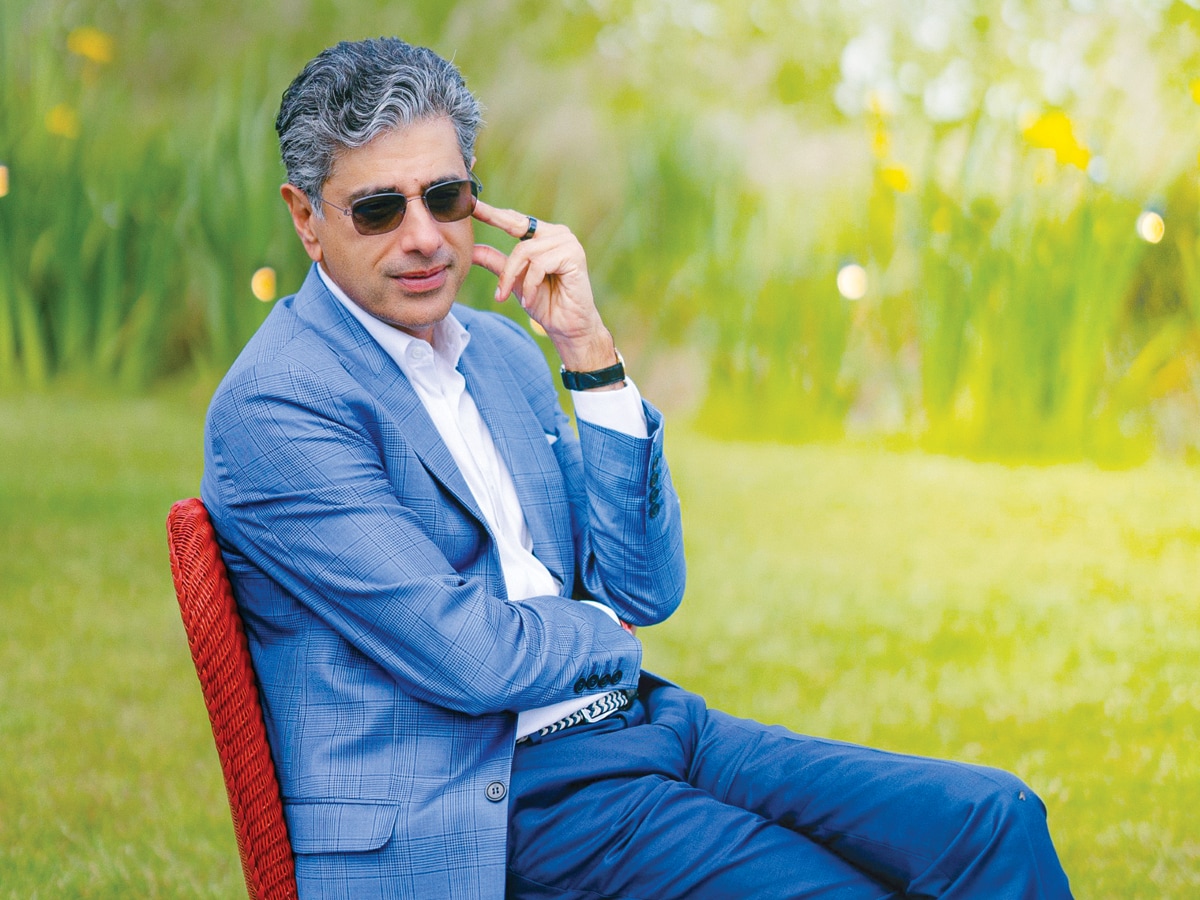Alok Sama’s memoir The Money Trap is a story of what goes on behind the making—and unmaking—of some of the biggest businesses in the world. For approximately five years from 2014, Sama was the chief dealmaker at SoftBank, one of the most influential technology investors. As he speaks with Forbes India in early April, Masayoshi Son, SoftBank’s maverick founder and CEO, is pouring billions into US President Donald Trump’s artificial intelligence (AI) project, Stargate. “Son genuinely does live in the future,” Sama says of his former boss and his ability to bet on big technological trends, while talking about how the billionaire investor picks his inner circle, and why his initial investment thesis on India stands to this day, and for the near future. Edited excerpts:
Q. Why did you title the book The Money Trap for a story largely about your career at SoftBank?
There is a lot more to the book than just talking about Masayoshi Son, SoftBank and business. What I mean by money trap is what I have observed in Wall Street, in particular, and Silicon Valley too. People being caught up in money. It becomes a key part of their identity. It is addictive and they are unable to break away, even when they get to a point where it’s costing them, compromising on their health and family life. But they are unable to break away.
Q. If the reasons for your exit from SoftBank had not existed, would you have broken away?
A lot happened in my life that proved a catalyst for leaving SoftBank. Losing my parents, the grieving process, had a lot to do with it. The whole smear campaign [A Wall Street Journal article in 2020 reported that Sama and former SoftBank COO and President Nikesh Arora were targets of an internal smear campaign at the company; Sama quit in April 2019 as CFO] was incredibly stressful. It was impacting my health, my sleep… so it was a combination of circumstances. But yeah, I am not, for a minute, suggesting I was some kind of a hero who walked away, a monk who sold his Ferrari. I have never had a Ferrari, by the way. All that is incredibly preachy. For me, [walking away] was very much a matter of circumstance, and I am not advocating that people should just walk away. The book, as far as I am concerned, has no messages. The only purpose of writing it was to lay out my experience, and people can take away their own messages.

Q. Son has probably lost larger fortunes than any investor in the history of capitalism. Now with his recent investments in AI—we’ll talk that about in a bit—he’s continued with his bold bets. What was it like adjusting to the vision of someone like that?
You have to approach it with a lot of humility. Son genuinely does live in the future, and has a remarkable track record of calling well in advance, literally all the technology mega trends over the last 40 years. Be it personal computers, then the internet and smartphones, and now AI. He’s made some mistakes, and people have somewhat unfairly made fun of him for making those mistakes. But his successes—look at Arm (semiconductor company)—far outweigh the setbacks. That’s just the nature of the technology game. My way of thinking was quite conventional. I came from a very analytical, mathematics, finance… that kind of thinking can actually hold you back. I would not have advocated that Masa invest in Alibaba, for example. When Jack Ma came to see Masa, he did not have a business plan to create the Amazon of China. His business plan was actually B2B. But Masa had the vision of how digital commerce would evolve in China and he saw in Ma a certain entrepreneurial brilliance, and bet on him. That’s something to be admired, it’s beyond pure analytics.
Also read: ‘Personalisation is an enterprise endeavour, not a marketing initiative’
Q. How did Son pick his inner circle?
There are people around him who have definitive roles. In his mind, he has his own operating system. I think he saw me as someone who could get large complicated deals done for him. In Nikesh Arora, he saw some of the qualities he saw in himself, and figured that Nikesh would be the one person who could succeed him. He saw different skills in people. Titles or seniority did not matter to Son. Once he pegged you as someone who can get something done, he will reach out to you, respect you, and treat you like a friend.
 Masayoshi Son is pouring billions into US President Donald Trump’s AI project Image: Andrew Harnik/Getty Images
Masayoshi Son is pouring billions into US President Donald Trump’s AI project Image: Andrew Harnik/Getty Images
Q. How does Son take business decisions?
He is not consensus driven, and he should not be, because he is one of a kind. He likes people to challenge him. He engages in discussion and debate, but once he has made up his mind, he is incredibly decisive. He has got enough of really big things right that I’m sure he feels comfortable backing himself. I was not around [at SoftBank] then, but clearly, after 2021, when they had some huge investing setbacks, his confidence was shaken for a while. As he himself describes it, he went into hibernation. But he seems to be back bigger than ever now.

Q. SoftBank recently led a $40 billion funding round into OpenAI, and Son is a central character in Trump 2.0’s $500 billion AI project Stargate…
I think the Arm success has given him a lot of firepower. The mark-to-market game on Arm was over $100 billion and that gives him the ability to, if not monetise, leverage against that. That, combined with the cash resources, gives Masa Son a lot of firepower. He was talking about AI and singularity (when machine intelligence overtakes human intelligence) even when I joined SoftBank in 2014. It was difficult at the time of the Vision Fund to invest $100 billion around the AI theme, but now you can. The beauty of Stargate is that it is an infrastructure project, so it does not necessarily bet on one particular application. It is a bet on AI being transformative and compute capacity increasing exponentially over the next few years. A lot of capacity needs to be created, and not just data centres. It is also about energy infrastructure. SoftBank is among the bigger generators of solar power in the world. So, this plays into SoftBank’s skills in terms of executing large-scale infrastructure projects.
Q. When you write about someone like Son, do you have to pull a few punches?
For me, it was just about trying to be as accurate as possible. This is not an unofficial biography of Masa Son. I’m just talking about my observations. I describe my first lunch with Son, and I felt that this was a person I liked being with. He increased my energy. That is important if you are going to spend a lot of time working with an individual. I thought his idealism is genuine. I don’t think he was motivated by money. I loved the fact that he could laugh about losing tens of billions of dollars and that he had a mission to use technology to change the world. So, what I was trying to do, while being sensitive to his privacy, is to be as honest as possible in getting down on paper how I felt.

Q. Could Son’s investment thesis on India back in the day have changed today?
Masa Son’s ‘time machine’ strategy for India, and it’s similar to his thesis on emerging markets generally, was to take technology business models successful in the Western world, in the US in particular, and transport them to India with tweaks for the local market. Those models will be even more successful in India because there is less legacy technology to disrupt. Be it ride hailing or fintech or ecommerce, you do not have to disrupt legacy infrastructure, so you don’t have the same type of resistance you might have in the Western world. You can debate why this is the case, but there really has not been what I would call groundbreaking technology innovation coming out of India. China, most recently, had DeepSeek, and earlier TikTok.
Those businesses had a technology edge that resonated and were very successful in the Western world. India hasn’t had that. So, the investment thesis in India is still the same time machine strategy. And there’s nothing wrong with that, by the way. It’s a growing economy, young population, you just ride that trend. It’s actually relatively low risk.
Q. What would it take to spur technological innovation in India?
Karthik Reddy of Blume Ventures made an interesting point to me. He said that the view
of LPs (limited partners) and institutional investors is that if they have to invest in disruptive technology, they have that covered in funds sponsored by the likes of Sequoia or Benchmark, blue chip names in the Valley. When they are investing in India, they are looking to get behind the secular consumer class, middle class growth trend. There is less of a venture capital infrastructure in India, the brain drain is very real, in terms of the number of IIT engineers who aspire to be in the US. Although it is going to get tougher for them, it’s still very aspirational to go to the US. So those are some of the reasons, perhaps, you are not seeing as much of a genuine deeptech innovation in India as might happen otherwise.
(This story appears in the 18 April, 2025 issue
of Forbes India. To visit our Archives, click here.)
